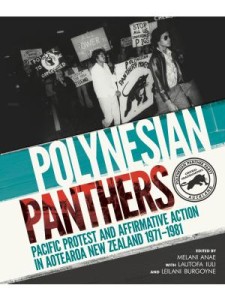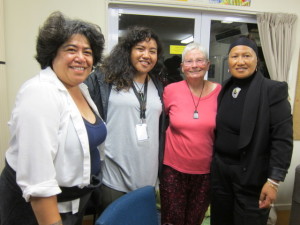On March 23, the Auckland Women’s Centre hosted a wonderful forum, “Women in the Polynesian Panthers and their Legacy”.
It was deeply moving to hear three women speak about their experience of joining Polynesian Panthers to fight racism in Auckland in the 1970s. It was also inspiring to listen to the daughters of two former members talk about how their parents’ involvement affected their lives, and their views on what has- and has not – changed today for Maori and Pasifika people.
Ruth Busch, a member of the Women’s Centre Governance Collective, has written a great account of the evening which we share below.
For Charmaine, there was special poignancy in hearing from Melanie Anae and Miriama Rauhihi Ness.
Melanie, an AGGS student before Charmaine’s time there, talked about sneaking out at night from her conservative Samoan home to attend Panther meetings. With two colleagues, she has just published a book about the Panther movement in Aotearoa.
Linking up again with Ama brought back memories of the evening she visited Charmaine’s home with Rosemary Ronald, a teacher at AGGS, and spent three hours challenging Charmaine about the institutional racism of the school, and demanding that, as Principal, Charmaine take action to challenge and change it. Charmaine owes her a huge debt for enlarging her understanding of racism, and opening her to the urgent need for change and the obligations of educators.
We both enjoyed spending time , too, with some of the young women there:
- Linda T, Samoan media artist and teacher (also ex -AGGS)
- Amiria Puia-Taylor, of Ngaati Te Ata Waiohua, artist, curator and youth worker
- Simone Fa’alogo, curator of an art space in Otara
all three of whom challenge our our society to change for the better through their art, cultural and educational activities.
We are very fortunate to have women of such talent and resourcefulness working to make Aotearoa a more just and inclusive country.
Ruth Busch’s account of the evening
A wonderful evening (also empowering, stimulating and reflective to list just a few more superlatives to describe this event) took place at the Auckland Women’s Centre on the 23rd of March. As a follow-up to the previous Sunday’s fundraiser documentary about the Black Panther Party in the US, the Centre organised a panel discussion focussing on Women in the Polynesian Panthers and their Legacy. It was facilitated by Papatuanuku Nahi who welcomed the jam packed, mostly women, audience with a karanga that set the mood for the evening.
The speakers’ panel was made up of Panther members, Miriama Rauhihi Ness and Dr Melani Anae, or (like our facilitator, Papatuanuku Nahi and her sister, Kaile Nahi-Taihia) women who traced their current activism directly to being raised by Panther parents. Sina Brown-Davis, Te Wharepora Hou member, and our speaker prior to the documentary screening, was also a panel member. The speakers discussed racism and other abuses that had led them to form/join the Panthers in the 1970s, their numerous successes and the issues remaining to be addressed still/now. It was inspiring to hear how these women (sometimes as school girls who had to sneak out of their homes in order to attend meetings) challenged the individual and systemic racism that was so commonplace in their lives. Drawing inspiration from the ideas of the Black Panther movement developing in the States, these foremothers and their Panther brothers made the myriad forms that racism takes visible and formulated an analysis that was both anti-capitalist and anti-racist. Their actions underscored what second wave feminists were also learning that the personal is political, that our lived experiences matter.
More than that, that activism was the answer. Pacific Island and Maori communities could not wait for the government to come up with answers to homelessness, poverty, police harassment and enforced incarceration. The Dawn Raids in 1976 underscored both the systemic racism of the Muldoon government and the effectiveness of the solutions the Polynesian Panthers came up with. Within 6 weeks of Panther action to carry out Dawn Raids on Ministers of the National Government (complete with sound systems and floodlights and press), Muldoon’s Dawn Raids were halted. In addition, the Panthers led strikes, educated people about their legal rights, opened homework centres, gave rides to families of prisoners, fought for improved housing and for a better educational system.
It’s hard to give a sense of the privilege that we, the listeners, felt as we heard the stories of the founding mothers of the Polynesian Panthers, this movement literally formed on the streets of Grey Lynn and Ponsonby. Their presentations “humanised” the Struggle and their present day staunchness moved us all. Each of the participants is still advocating for change and direct action. Each emphasised that many of the gains made in the past have now been eroded and/or better hidden, and that the analysis of the Polynesian Panthers is still relevant. Poverty and racism continue to be the reasons why Maori and Pacific Islanders remain at the bottom of the heap in so many areas. The fight against inequality is alive and well. Prisons are big business in Aotearoa today and the neo liberal narrative that calls for the privatisation of prisons, state housing, and child protection is proceeding apace. Lawyers, psychologists, the justice system itself all make good livings from the misery of black people. Climate change is a price being paid by the Pacific for the West’s industrial development. Black lives matter everywhere.
It was wonderful to hear the history of the Polynesian Panthers told by women who were its founders. These women were part of a bridging generation: they were often first generation kiwis born of immigrant parents, attempting to envision who they were, shaped by intergenerational disjuncts between their island born/non-urban parents and themselves, trying to understand what it meant to be black and kiwi within a context of white racism. They challenged us to re-commit ourselves to their basic principles:
- to annihilate all forms of racism and
- to celebrate Mana Pasifika.
They inspired us, especially the many young people in the room who were encouraged to take on the most pressing issues they face, learning from what has gone before and from what has been developed overseas but finding their own Aotearoa based answers, while standing proud.


 Earthsong Eco Neighbourhood
Earthsong Eco Neighbourhood Public Good
Public Good
Speak Your Mind